Kerne Surname Ancestry ResultsOur indexes 1000-1999 include entries for the spelling 'kerne'. In the period you have requested, we have the following 13 records (displaying 1 to 10): Buy all | | | Get all 13 records to view, to save and print for £52.00 |
These sample scans are from the original record. You will get scans of the full pages or articles where the surname you searched for has been found. Your web browser may prevent the sample windows from opening; in this case please change your browser settings to allow pop-up windows from this site. Close Rolls
(1441-1447)
The close rolls of the 20th to 25th years of the reign of king Henry VI record the main artery of government administration in England, the orders sent out day by day to individual officers, especially sheriffs of shires: they are an exceptionally rich source for so early a period. There is also some material relating to Wales, Scotland, Ireland and the English possessions in France. KERNE. Cost: £4.00.  | Sample scan, click to enlarge

| Liegemen and traitors, diplomats and spies
(1540-1542)
The Privy Council of England dealt with many delicate and important matters of state. The surviving records date back as early as the 14th century, but Henry VIII on 10 August 1540, with the advice of the council, ordered that the council should have its own clerk 'to write, entre and registre all such decrees, determinacons, lettres and other such things as he shuld be appoynted to entre in a booke, to remayne alwayes as a leger, aswell for the dischardge of the sayd counsaillours touching such things as they shuld passe from tyme to tyme, as alsoo for a memoriall unto theim of their owne procedings'. The register from that date to 8 April 1542 was transcribed for the Commissioners of the Public Records by sir Harris Nicolas, and published in 1837. Although the council often dealt with petitions from aggrieved subjects, its main function was to oversee internal and external security.KERNE. Cost: £4.00.  | Sample scan, click to enlarge
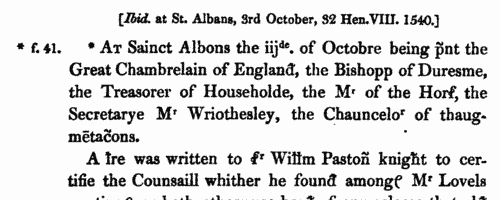
| Liegemen and Traitors, Pirates and Spies
(1542-1547)
The Privy Council of Henry VIII was responsible for internal security in England and Wales, and dealt with all manner of special and urgent matters
KERNE. Cost: £4.00.  | Sample scan, click to enlarge

| Liegemen and Traitors, Pirates and Spies
(1547-1550)
The Privy Council of Edward VI was responsible for internal security in England and Wales, and dealt with all manner of special and urgent matters
KERNE. Cost: £4.00.  | Sample scan, click to enlarge

| Churchwardens and other parishioners in Buckinghamshire
(1552)
In accordance with a royal commission of 16 May 1552, inventories were taken of the valuables held by individual parishes throughout England. These records survived in the Public Record Office, and were transcribed by the Reverend J. E. Brown, vicar of Studham, edited for the Alcuin Club by F. C. Eeles, and published in 1908. Some additional material from Additional MS 34,741 and Lansdowne MS 1045, in the British Museum, was incorporated. The people whose names appear in these records are mostly the churchwardens and those respectable parishioners to whose custody some of the valuables had been entrusted.KERNE. Cost: £4.00.  | Sample scan, click to enlarge
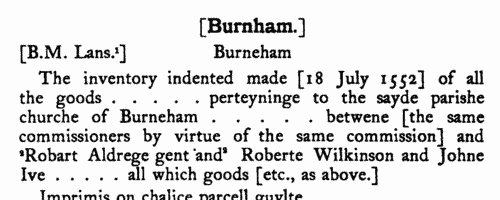
| Cecil Manuscripts
(1590-1594)
Letters and papers of William Cecil lord Burghley, Lord Treasurer of England.KERNE. Cost: £4.00.  | Sample scan, click to enlarge
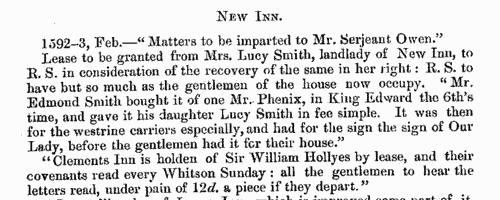
| Official Papers
(1645-1647)
The State Papers Domestic are the main series of records of internal British administration for this period. The volumes printed in abstract here (Charles I dx to dxv) run from July 1645 to December 1647, a period of defeat of royal power by the parliamentary forces. Parliament's victory at Naseby in June 1645 led to the collapse of the Royalist cause and the imprisonment of the king in Carisbrooke Castle towards the close of 1647. During all these events the administration of government continued, largely using the same institutions, leaving similar series of records as before: but executive power is now represented in these books by the Committee of Both Kingdoms (England and Scotland). The State Papers Domestic for these years are largely concerned with the prosecution of hostilities, the movements and supply of troops, and the treatment of 'delinquents'. Chronologically interleaved with the abstracts of the main volumes are details from the series of Proceedings of the Committee of Both Kingdoms, but these are lost for the years 1646 to 1647, brief notes only surviving in the Indexes to the Day Book of Orders. There are also appendices relating to the victualling and disposition of the Navy, taken from the Letters and Papers of the Committee for the Admiralty and the Committe of the Navy, which also include some petitions from sailors, victuallers, officials, or their dependants, seeking redress or relief.KERNE. Cost: £4.00.  | Sample scan, click to enlarge
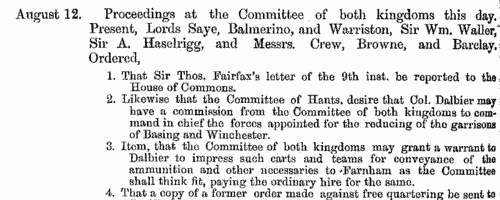
| Allegations for marriages in southern England
(1679-1687)
The province or archbishopric of Canterbury covered all England and Wales except for the northern counties in the four dioceses of the archbishopric of York (York, Durham, Chester and Carlisle). Marriage licences were generally issued by the local dioceses, but above them was the jurisdiction of the archbishop, exercised through his vicar-general. Where the prospective bride and groom were from different dioceses it would be expected that they obtain a licence from the archbishop; in practice, the archbishop residing at Lambeth, and the actual offices of the province being in London, which was itself split into myriad ecclesiastical jurisdictions, and spilled into adjoining dioceses, this facility was particularly resorted to by couples from London and the home counties, although there are quite a few entries referring to parties from further afield. The abstracts of the allegations given here usually state name, address (street in London, or parish), age, and condition of bride and groom; and sometimes the name, address and occupation of the friend or relative filing the occupation. Where parental consent was necessary, a mother's or father's name may be given. The ages shown should be treated with caution; ages above 21 tended to be reduced, doubtless for cosmetic reasons; ages under 21 tended to be increased, particularly to avoid requiring parental consent; a simple statement 'aged 21' may merely mean 'of full age' and indicate any age from 21 upwards. These are merely allegations to obtain licences; although nearly all will have resulted in the issuing of the licence, many licences did not then result in marriage. KERNE. Cost: £4.00.  | Sample scan, click to enlarge

| Treasury Books
(1689-1692)
Records of the Treasury administration in Britain, America and the colonies.
KERNE. Cost: £4.00.  | Sample scan, click to enlarge
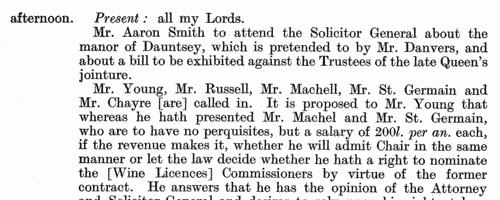
| House of Lords Proceedings
(1692-1693)
Private bills dealing with divorce, disputed and entailed estates: petitions, reports and commissions: naturalisation proceedings.
KERNE. Cost: £4.00.  | Sample scan, click to enlarge

|
| 1 | 2 |  |
Research your ancestry, family history, genealogy and one-name study by direct access to original records and archives indexed by surname.
|












